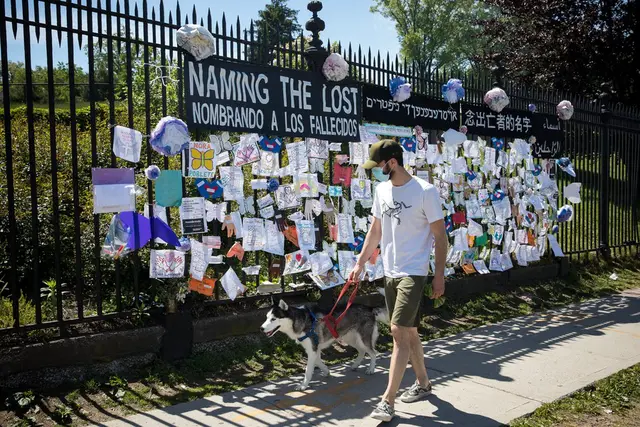A man wearing a face mask walks past a memorial for COVID-19 victims in front of Green-Wood Cemetery in Brooklyn of New York, the United States, May 27, 2020. (Photo by Michael Nagle/Xinhua)
--In dealing with COVID-19, some U.S. politicians have disregarded people's health and lives, and prioritized electoral politics and capital gains.
--George Floyd's misfortune not only resulted from America's entrenched, systematic racial discrimination, but also served as an epitome of the aggravated sufferings facing non-white Americans during COVID-19 epidemic.
--Besides exporting COVID-19, the common enemy of mankind, the United States has long shown indifference to the urgent need for unity and solidarity in the global fight.
BEIJING, July 24 (Xinhua) -- Disregarding citizens' lives, discriminating against minority racial groups and damaging international cooperation, Washington's behavior amid the ravaging COVID-19 pandemic has laid bare its true color on human rights.
The current U.S. administration's response to the coronavirus disease, widely deemed to be bungled and botched, has exacerbated such deep-rooted problems in the country as social division, wealth gap, racial discrimination and poor protection of the rights and interests of vulnerable groups, and meanwhile revealed Washington's hypocrisy and duplicity on human rights.
In the eyes of many observers, the U.S. image of "a city upon a hill," a portrait of the country as a "beacon of hope" for the world, is fading away.
"People advocating and fighting for democracy, human rights and freedom around the world are disillusioned by the U.S. government and don't view the current administration as a true partner," said David Kramer, a former U.S. assistant secretary of state for human rights.
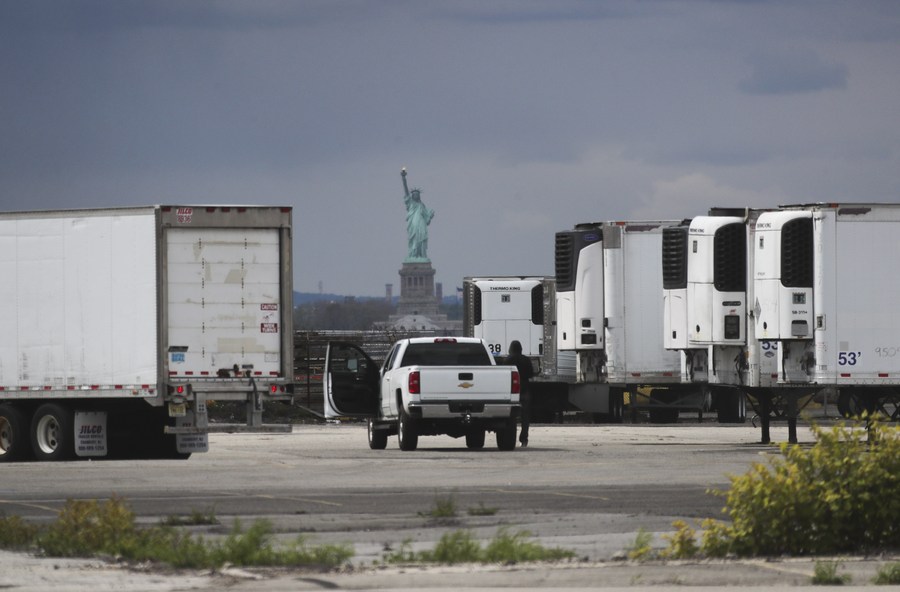
Refrigerated trailers are seen at a temporary morgue in Brooklyn of New York, the United States, May 11, 2020. (Xinhua/Wang Ying)
DISREGARD: NOT ALL HUMAN LIVES COUNT
Despite early warnings about the novel coronavirus, the United States soon became the world's hardest-hit country with the most confirmed cases and the highest death toll, even though it enjoys the greatest economic and technological strengths and the most abundant medical resources in the world.
The number of COVID-19 cases in the United States surpassed the 4 million mark on Thursday to reach 4,005,414 as of 3:04 p.m. local time (1904 GMT), according to the Center for Systems Science and Engineering at Johns Hopkins University. Meanwhile, the national death toll from the disease rose to 143,820.
COVID-19 has become the No. 1 cause of death in the United States, killing more people per day than cancer or heart disease, according to a graph published in Newsweek on April 9. The disease killed more Americans than the Korean War, Vietnam War, War in Afghanistan and Iraq War combined.
Many of those deaths could have been avoided had the administration of President Donald Trump been more proactive in combating the pandemic. A study by Columbia University researchers estimated that if the United States had started locking down cities and ordering social distancing two weeks earlier on March 1, about 83 percent of the deaths that had occurred in the country by early May would have been avoided.
The U.S. government's selfishness, short-sightedness, fickleness, incapacity and irresponsibility have all been exposed in its disappointing handling of the pandemic. Washington can in no way shirk the blame for the stunning toll the raging epidemic has inflicted upon the country.
Due to its flagrant disregard for early warnings, Washington missed the narrow window to nip the contagion in the bud. In dealing with COVID-19, some U.S. politicians have also disregarded people's health and lives, and prioritized electoral politics and capital gains.
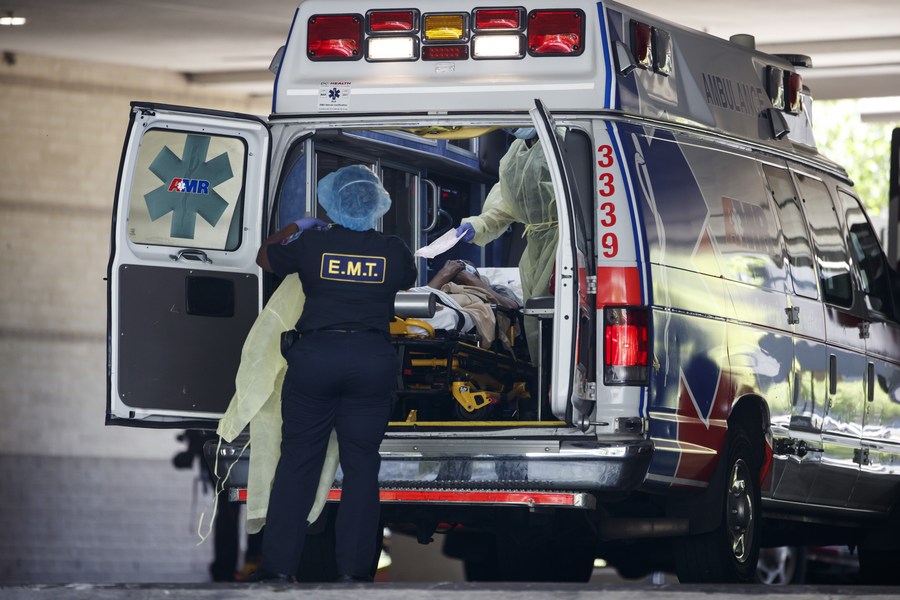
Medical workers transport a patient from an ambulance to George Washington University Hospital in Washington D.C., the United States, May 13, 2020. (Photo by Ting Shen/Xinhua)
As the pandemic keeps deteriorating, those politicians, instead of stepping up their efforts to battle the coronavirus, have been obsessed with politicizing relevant issues and scapegoating others. With the illness still uncontained, they disregarded professional warnings and rushed to loosen restrictive measures for economic gains, which only triggered a rebound of the outbreak.
Gregg Gonsalves, co-director of the Global Health Justice Partnership at Yale University, said the Trump administration's COVID-19 response is "getting awfully close to genocide by default."
"How many people will die this summer, before Election Day? What proportion of the deaths will be among African-Americans, Latinos, other people of color?" he tweeted on May 6. "What else do you call mass death by public policy?"
Unfortunately, the country's vulnerable groups, including the elderly, the poor, African Americans and Latino Americans, have borne the brunt of COVID-19 and remain most at risk.
In at least 23 U.S. states, a majority of deaths were linked to nursing homes, according to The New York Times. As of July 15, deaths in long-term care facilities accounted for more than 42 percent of the country's pandemic fatalities.
However, some in the U.S. elite do not seem to care. Dan Patrick, lieutenant governor of Texas, told Fox News on March 23 that grandparents like him do not want to "sacrifice the country" and are "willing" to risk death to protect the economy for their grandchildren.

A car used for mortuary is seen at the Isabella Geriatric Center, a nursing home, in New York, the United States, May 3, 2020. (Photo by Michael Nagle/Xinhua)
Ben Shapiro, editor-in-chief for The Daily Wire, an American right-wing news website, suggested in an interview on April 30 that old people's life is not worth saving.
"If somebody who is 81 dies of COVID-19, that is not the same thing as somebody who is 30 dying of COVID-19 ... If grandma dies in a nursing home at age 81, that's tragic and it's terrible, also the life expectancy in the United States is 80," he said.
DISCRIMINATION: SUFFOCATING PREJUDICE
Not long before George Floyd was suffocated to death by a white police officer kneeling on his neck, he lost his job as a bouncer at a restaurant. The African American's misfortune not only resulted from America's entrenched, systematic racial discrimination, but also served as an epitome of the aggravated sufferings facing non-white Americans during COVID-19.
Long-standing systemic health and social inequities have also put racial and ethnic minority groups at higher risk of getting COVID-19 or losing their lives. They are also more vulnerable to the ensuing harsh economic impacts.
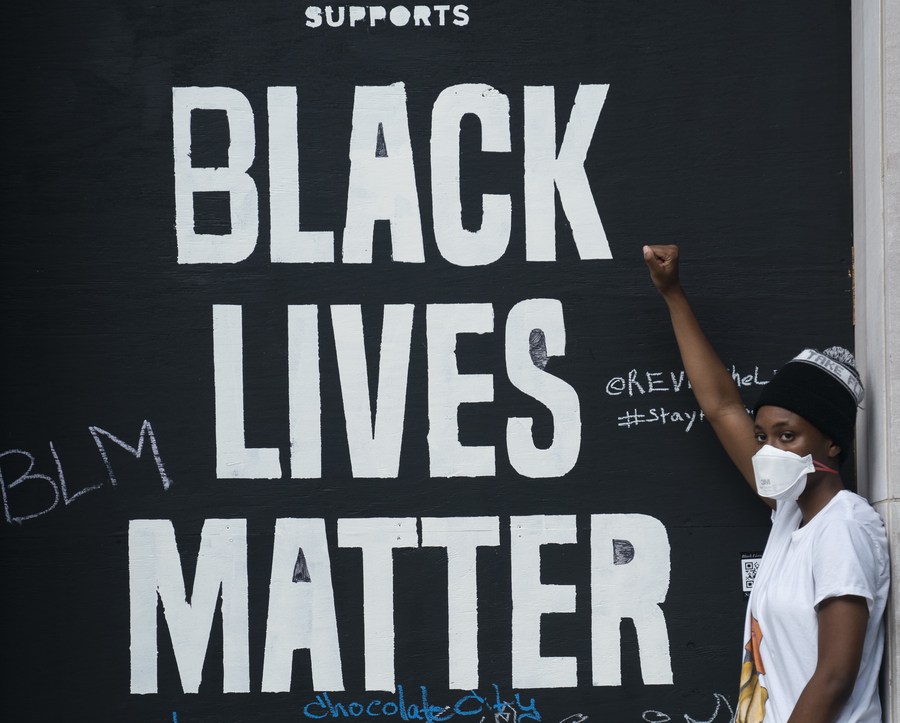
A girl poses with a slogan during protests against racial injustice to mark Juneteenth, commemorating the end of slavery in the United States, near the White House in Washington D.C., the United States, June 19, 2020. (Xinhua/Liu Jie)
As of June 12, non-Hispanic black persons had a rate of infection of or death from the coronavirus approximately 5 times that of non-Hispanic white persons, while Hispanic or Latino persons had a rate approximately 4 times that of non-Hispanic white persons, said the U.S. Center for Disease Control and Prevention (CDC) in a statement on June 25.
Because of the exorbitant cost of health insurance coverage, a large portion of U.S. ethnic minorities remain uninsured. In 2018, Hispanics and blacks had significantly higher uninsured rates, 19 percent and 11 percent respectively, than whites, with 8 percent, according to data compiled by the Kaiser Family Foundation, a U.S. non-profit organization.
The U.S. medical and health care systems do not show justice to African Americans. Compared with white people, African Americans receive less treatment, and the treatment they receive is of lower quality, according to Marc Morial, president of the National Urban League, the country's largest historic civil rights and urban advocacy organization.
"We are less likely to receive treatment for our complaints. Even with treatment, we are less likely to experience positive outcomes. The high level of disparity erodes Black Americans' trust in the health care system," he said in a statement on Thursday.
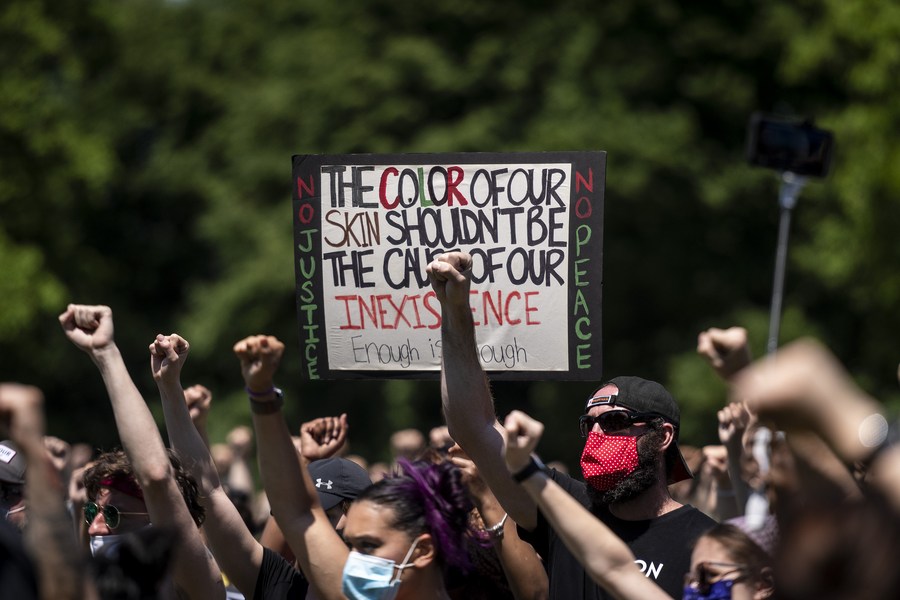
Demonstrators hold up fists during a protest over the death of George Floyd in Chicago, the United States, June 6, 2020. (Photo by Chris Dilts/Xinhua)
On the labor market front, the racial unemployment gap has been further widened during the pandemic. In June, America witnessed the widest gap between African Americans and whites in five years.
The jobless rate for the colored group plunged to 15.4 percent, while the rate for whites dropped to 10.1 percent, according to data released by the Labor Department on July 2.
DISUNITY: PUTTING WORLD AT RISK
Marvin Canahui, a 38-year-old Guatemalan migrant, said his own experience was typical of thousands of people who were held or deported by U.S. Immigration and Customs Enforcement (ICE) during the pandemic.
"They never even gave us hand soap or sanitizer for disinfecting," said Canahui, who has recently returned home after working in the United States for 17 years.
Except in the dining room and telephone area, there were no cleaning or preventive measures such as social distancing in the facility, where he shared a dormitory, showers and bathrooms with about 200 other migrants from Guatemala, El Salvador, Honduras and Nicaragua.
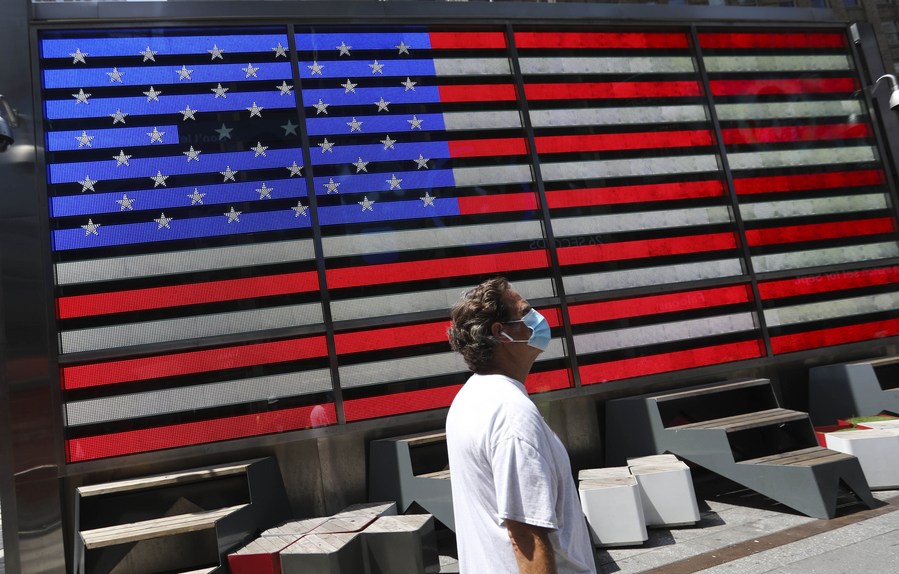
A man walks on Times Square in New York, the United States, July 23, 2020. (Xinhua/Wang Ying)
Under the pretext of containing COVID-19 at home, some U.S. politicians have spared no efforts to push ahead with Washington's controversial immigration enforcement agenda, deporting thousands of Central Americans, including those infected with the coronavirus, to their home countries. The Trump administration has been undoubtedly exporting the virus to other countries, putting the whole world at high risk.
After the pandemic broke out in some detention centers, ICE, without testing the immigrants held there, still continued deporting them back to their home countries, according to a recent report released by the Center for Economic and Policy Research, a think tank based in Washington.
It found in late May that since March 13, ICE had made at least 135 deportation flights to 13 countries in Latin America and the Caribbean. Some deportees have later tested positive in Guatemala, Jamaica, Mexico, Colombia and Haiti.
Besides exporting COVID-19, the common enemy of mankind, the United States has long shown indifference to the urgent need for unity and solidarity in the global fight.
It keeps pursuing unilateralism in the name of "America First" through a series of moves, including imposing export bans on domestic medical supplies, and competing against other countries for coronavirus vaccine patents. In late June, the U.S. government bought up nearly all the next three months' projected production of remdesivir, a COVID-19 treatment drug, from U.S. manufacturer Gilead.
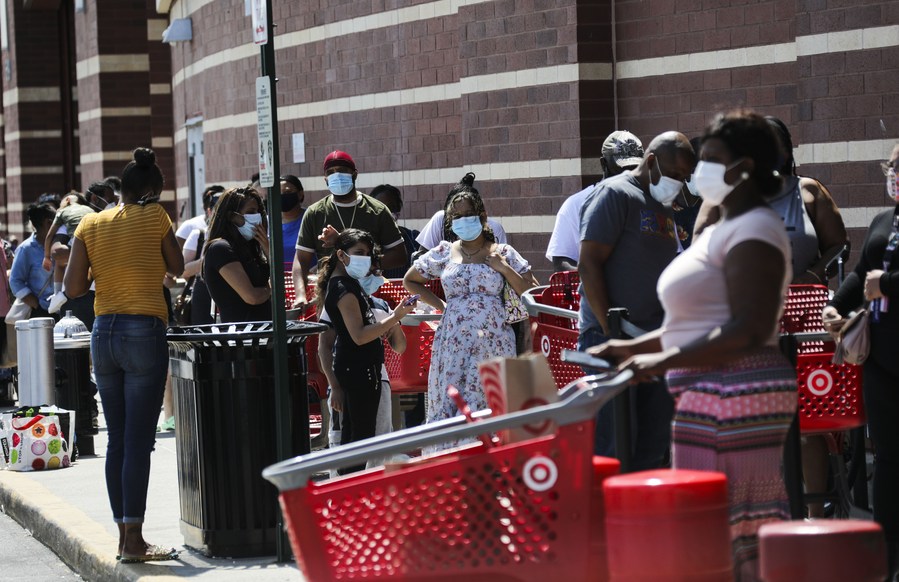
People line up to enter a department store in Brooklyn Borough of New York, the United States, on July 16, 2020. (Xinhua/Wang Ying)
Even worse, the Trump administration has decided to officially withdraw from the World Health Organization (WHO) in July 2021, which is bound to jeopardize the global fight against COVID-19 to the detriment not only of the world but also of the United States itself.
Lawrence O. Gostin, director of the O'Neill Institute for National and Global Health Law at Georgetown University and also director of the WHO collaborating center on national and global health law, has described the move as foolish, arrogant and disastrous.
To him, as well as to many others, the withdrawal "will make Americans less safe during an unprecedented global health crisis."
 简体中文
简体中文

